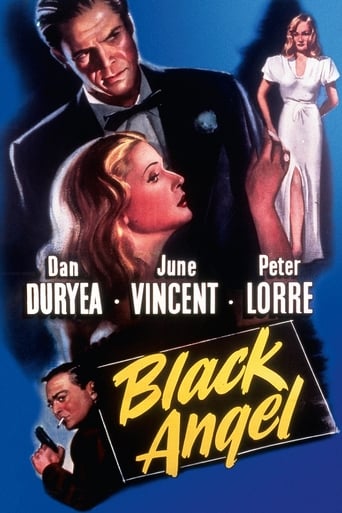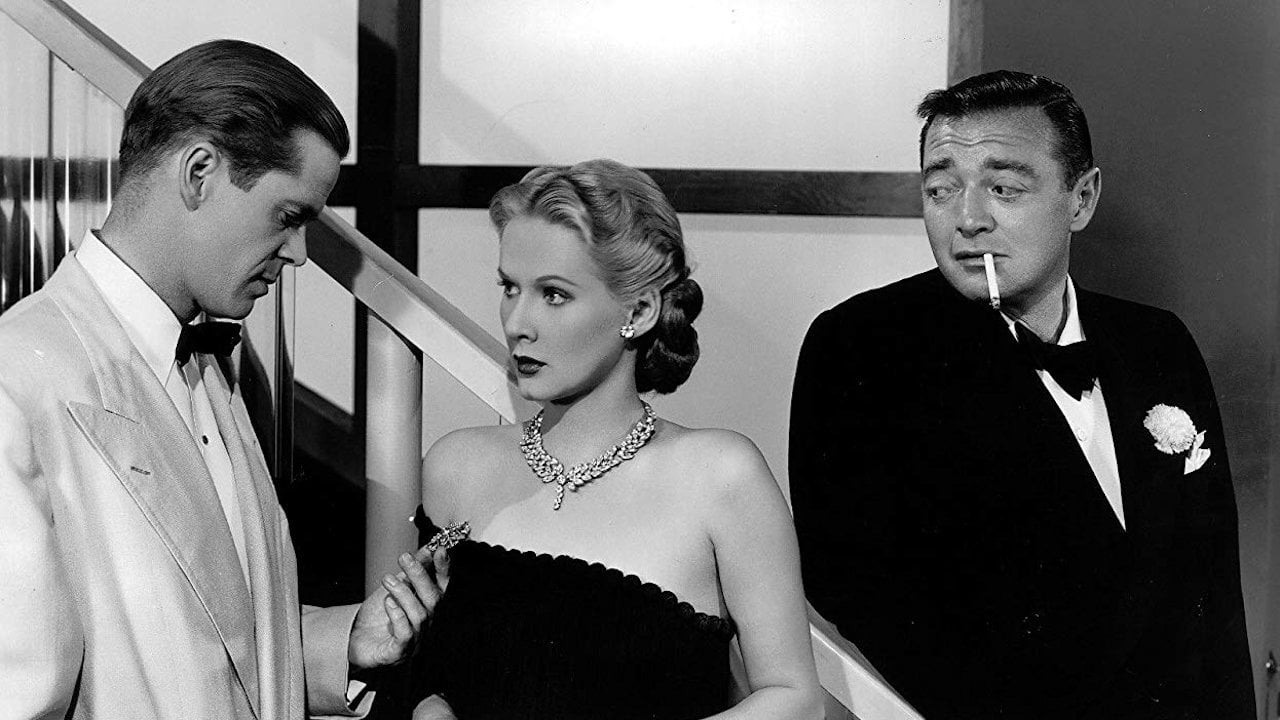bnwfilmbuff
This gets off to a strong start. We have a blackmailing socialite singer (Dowling) get murdered. A guy (Phillips) stumbles into her apartment touching everything in sight including the murder weapon to ensure he is the number one suspect. He gets nabbed and railroaded into a quick conviction. His wife (Vincent) takes up the cause of trying to find the killer enlisting the help of the murdered woman's drunken piano-playing husband (Duryea), who evidently was not at the trial! Peter Lorre, a nightclub owner/mobster, hires the couple as performers in his club and subsequently is suspected by the couple as the probable real killer. One big problem with all of this is the speed of conviction and trial seems improbable. But the other is that there are just no other suspects. We know Phillips isn't the killer. And it becomes all too obvious who is. And the movie drags as the romance between Duryea and Vincent develops. Duryea was far better in bad guy roles. Broderick Crawford is as subdued as I have ever seen him. Wallace Ford has a nothing role. Lorre does a pretty good job for what he has to work with. Constance Dowling was the best part of the movie but she doesn't last long. Fortunately, neither does the movie. So in spite of the good start and noirish atmosphere I can't recommend this.
oparthenon
I hate to carp, but this mostly watchable film, Roy Neill's last, is not film noir at all, although it has elements of mystery and crime drama combined. A weak and wayward script introduces Duryea arriving on a gritty Wilshire Blvd and then leaves him out of the film for twenty minutes; dispenses with the most interesting character of the film, singer Mavis Marlowe (wonderfully played by Constance Dowling) after ten minutes; presents a completely new character, Kirk Bennet, without any introduction or setting, as the husband of still another unknown character, a Mrs Bennet (June Vincent), who turns out to be the central female role; and even presents us with a completely anonymous character who seems to be central to Duryea's Martin Blair -- a wavering tippler- turned-songwriter -- who flits in and out of the film like a jack-in- the-box without explanation or rationale, but seems very concerned about Blair's well-being (is he his agent? his manager? a liquor salesman? We'll never know.) Neill directs this ambivalent script with occasional flair, like the sweep up from street-level Wilshire Blvd to Mavis Marlowe's flat on an upper floor of the apartment building across the street, which we then enter via a crack in the Venetian blinds. But much of the film is wasted on unnecessary moments like Bennet's trial, or Bennet being grilled by an almost-svelte Broderick Crawford playing the hard-boiled police captain (complete with an early version of what today is called good cop-bad cop.) I didn't like the film but Paul Ivano's photography is captivating and the film-score is unique: many popular songs found in big studio B&W's from this period (just before and just after WW II) can be banal and lifeless, but the three songs featured in Black Angel are well-crafted and complex songs in the popular idiom of the day. They are well-integrated into the plot, well-sung, and with stirring and original Jack Brooks lyrics and subtle melodies from Edgar Fairchild. Frank Skinner's score is also stirring and grand. BTW, June Vincent is not singing and Duryea is definitely not playing piano, for those curious: his fingers remain taut and straight throughout his first number, and in pianism the hand must be slightly arched if it is going to strike keys; but both he and June Vincent are well-mimed. This is good B entertainment, but contains about three plots in one: who did the murder, will the Duryea-Vincent match-up work out, and will the Duryea character ever recover from his alcohol addiction? Actually a fourth story line, will the Kirk Bennet character be saved from the gallows, is thrown in for good measure. Worth watching for the good acting, the unique pairing of Duryea-Vincent, the good photography, and Lorre's thinly-scripted but always-nearly-sadistic characterization of Duryea's nemesis.
dbdumonteil
What's lacking here is a great director,someone like Robert Siodmak ("Phantom Lady" ) or Mitchell Leisen ("No man of her own").Who says Truffaut?("the bride wore black").Even flawed ,"Black Angel" is far better than the two Truffaut movies (the second being "La Sirene Du Mississipi" ) cause only an American can feel the desperate atmosphere of Cornell Woolrich's (aka William Irish)best novels and short stories.Generally the character who experiments tragedy is a woman ;such is not the case here.Martin is the loser,the unfortunate expiatory victim who is looking for a second chance.Some people won't accept the fact that half of the action is based on a wrong track:it's necessary to make us feel Martin's growing hope.His moonlight sonata is not only a warning,it's also a love message (look at his face when he is playing ) When Cathy tells him there can only be one man in her life ,he's got no reason to live anymore.Hence this ending a la "lost weekend" (which was released the precedent year) and these words of Martin when he says he is happy now.William Irish's novel was arguably not his best :the story is too close to that of "phantom lady" and Cathy becoming a singer overnight is not very plausible. But it's Dan Duryea's hope against hope and his face longing for happiness and peace of mind that will haunt you after watching this good film noir.
MisterWhiplash
I wish I couldn't recommend Black Angel, but as it stands it's a passable film-noir that happens to contain some moments of good suspense. This comes, frankly, after the first expectation has been passed aside (to put it this way, if you introduce the gun in act 1, as the director does here with Peter Lorre, you expect by act 5 it'll go off in a BIG way, which it does not here for sure) and we're left with something else that is even more expected. One does hope that things might turn out not so great, actually, to make it more dramatically horrific and worthy of the dark tones of the style and definite noirish characteristics of the lighting. While the actors, mostly Dan Duryea and for what he's worth in an underused role for Peter Lorre, do what they can, it kind of reverts back to what was in the Hayes code at the time, which was that justice must be served and the real criminals couldn't get away with the crime and yada yada.The source material from Cornell Woolrich supplied some good dialog and a mid-section involving the piano player and his singer (quite a team they make for all of five minutes), but I wonder if the material was much the same in the story as here. The ideas of guilt and repression come out differently here, which is the one plus, in that Duryea only comes off like a total sneaky little s*** in one scene (the one right before he goes to drink his head off a second time around), and makes the character almost sympathetic amid drunken hazes and horrible moments of violence. There's a lot going for Black Angel, but the director only realizes some of the possibilities and leaves the rest as B-movie fodder- not even a shot imitating that of Vidor's The Crowd or some interesting "hazy" camera-work can make this truly notable... just, not bad.


 AD
AD



